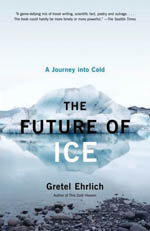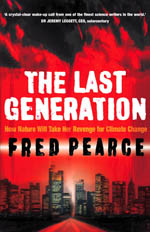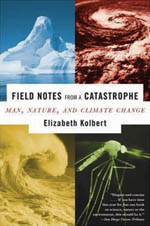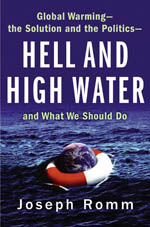Six Books That Will Boost Your Climate Change Awareness
Read All About It
After reading a truckload of books on climate change, I’ve come to view the subject much as I view aging: Sometimes I just don’t want to think about it. Unfortunately, climate change is a problem with a very high “procrastination penalty,” as scientists put it. That is, the longer we wait to act, the less chance we have of making a difference. To be sure, we cannot “stop” climate change-not only has global warming long since started, but the latest science says it will continue to gather momentum for thousands of years, even if we ceased all carbon emissions now. Nevertheless, we may still be able to mitigate some of its worst consequences.
The books reviewed below offer exceptional, lucidly written insights into the issue, and they describe ways we, as individuals, can work to reduce our carbon imprint. Their common message, however, is simple: Climate change is the most important issue in the world, and it cannot be meaningfully addressed without global political action.
The rapid pace of climate science means that books on global warming become outdated quickly. Most of the books below are relatively recent, and all are still very relevant. Read up-and take action.
The Future of Ice: A Journey into Cold
by Gretel Ehrlich

Two years ago, Ehrlich, who resides half the year in Santa Barbara and half in Montana, published this short, lovely book. In it, she describes a “journey into the cold”-a series of excursions to remote locales: Greenland, Patagonian Argentina, the backcountry of Montana. Brimming with quiet, elegant descriptions of her encounters in the wild, The Future of Ice is a celebration of the earth’s frozen climes. But it is also an elegy-a “cry for help,” she writes, “not for me, but for the tern, the ice cap, the polar bear, and the lenga forest; for the river of weather and the ways it chooses to be born.”
Warmer, Warmer
by John Lanchester
This long-form essay was published in March in the London Review of Books. It can be accessed by visiting londonreviewofbooks.com. If you haven’t time for one of the longer books, or are looking to supplement them with an essay, read this. Witty, cutting, and psychologically acute, it manages to sum up current science, current politics, and current culture on climate change in 8,543 beautifully turned words. Warmer, Warmer speaks directly to the average reader, to its great credit. “Are people going to give things up in the present in order to prevent things that computer models tell them are going to happen in 25 years’ time?” Lanchester asks.
Last Generation
by Fred Pearce

My favorite book on climate change, this is also the scariest book I have ever encountered. Pearce is a longtime environment reporter for the venerable British science journal New Scientist; his book is subtitled Read this book. Your children’s future depends on it. For once, idiotic publishing boilerplate is actually appropriate. The Last Generation is an elegant and accessible account of the history of climate change. Pearce’s central point is that if we take past climatic shifts as proxies for the future, when change comes, it will be violent and abrupt. “The history of our planet’s climate shows that it does not do gradual change,” Pearce writes. “Under pressure, whether from sunspots or orbital wobbles or now from the depredations of humans-it lurches, virtually overnight.” The Last Generation was published in 2006; Pearce now has a new book out in hardcover-With Speed and Violence: Why Scientists Fear Tipping Points in Climate Change.
Field Notes from a Catastrophe
by Elizabeth Kolbert

Also an excellent introduction to climate change. Kolbert, as befitting a New Yorker magazine reporter, writes clearly and robustly, managing to convey her sometimes dauntingly specific subject matter in a highly accessible way. Field Notes, which began as a three part series in The New Yorker, is relatively current about most of the large-scale assessments of climate change. Kolbert intersperses the science with snippets of human interest, enlivening the narrative and matching it to the temper of the issue: We read not only about the effects of climate change, but the people-and creatures-affected.
Climate Change 2007: The Fourth Assessment Report
by the Intergovernmental Panel on Climate Change

This text can be downloaded free at www.ipcc.ch. Despite the book’s antiseptic title and the panel’s status as a UN body, the IPCC is not some quasi-socialist manifestation of international devilry, as Rush Limbaugh would have it. The way it works is that 2,000 scientists write a report, and then argue about it with political representatives of 100 of the world’s governments until they agree on a single text. Published in three installments, the 2007 SPM found that: (1) There is a 95-99 percent chance that human activity is causing the atmosphere to warm; (2) The warming is already changing the composition of the living earth, and in the future we can expect prolonged droughts and rising seas; and (3) To mitigate climate change we will need a global cap on emissions, at a projected cost of 3 percent of world GDP.
The SPM is dry, full of officious, bureaucratic writing, and includes only the most incontrovertible assessments of climate change. It is in most respects behind the most current science on climate change. Still, it is worth reading the text or, failing that, one of the excellent analyses of the document offered on realclimate.org, or by Bill McKibben in the The New York Review of Books: www.nybooks.com/articles/19981.
Hell and High Water: Global Warming
by Joseph Romm
Romm, a former official at the Department of Energy, is angry-at American apathy in the face of climate change, at congressional idiocy (in a March poll, only 13 percent of Republican representatives agreed that human activity is causing a dangerous warming of the atmosphere, as compared with 95 percent of Democrats), and most especially at the Bush administration, which he accuses of scandalous disregard for the danger posed by climate change. Romm also takes the press to task for feeding the politicization of climate change.



